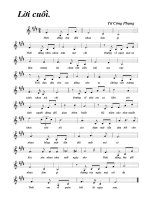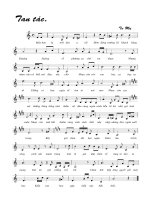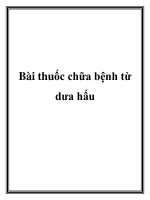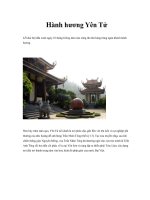Huong pagoda festival
Bạn đang xem bản rút gọn của tài liệu. Xem và tải ngay bản đầy đủ của tài liệu tại đây (87.53 KB, 10 trang )
HUONG PAGODA FESTIVAL
Together with Bai Dinh and Yen Tu Pagoda Festival, Huong Pagoda Festival
(also called Perfume Pagoda Festival) is considered the greatest Buddhist festival
in the North part of Vietnam. The festival plays an important role in the spiritual
life of Vietnamese people in the general and Vietnamese Buddhists in particular.
Huong Pagoda is located in My Duc District, 70 kilometers away from Hanoi
to the south. This festival lasts for three months from 6 th day of the first lunar
month to the 15th day of the third lunar month. In fact, the main festival days
lasting from the 15th day to the 20th day of the second lunar month.
Annually, a huge number of pilgrims have been flocking My Duc District for
the three month Huong Pagoda Festival, enjoying the beauty of the Huong Son
limestone mountains at a time when apricot trees are in bloomand pay tribute to
Buddha, specifically to Avalokitasvara - one of Buddha's disciples. In the late
spring the trails leading up to the shrines are clogged with thousand making their
pilgrimage .
*Objects of worship: Sakyamuni Buddha, Phat ba Quan Am - Avalokitesvara
Bodhsattva (Goddess of Mercy).
Various interpretations are associated with Phat ba Quan Am. Legend has it
that the festival is held to worship a princess named Dieu Thien who incarnated
Avalokitasvara and attained enlightenment there. According to folklore, once upon
a time, there was a beautiful and kind-hearted princess named Dieu Thien—the
third daughter of King Dieu Trang, Huong Lam Kingdom. However, at the age of
getting married, the prince rejected all proposals from other countries and insisted
on leading a religious life. The King got very angry and locked her into the
backyard of his palace. As the princess’s decision was unchanged, King Dieu
Trang sent her to Bach Tuoc pagoda where she went through a wide range of
arduous works; still, she completed them all. Getting more and more displeased,
the King even set Bach Tuoc Pagoda on fire and jailed the princess into the
forbidden palace. However, Princess Dieu Thien was so determined that she
overcame all of the above challenges and difficulties. At the end, the King decided
to execute his stubborn daughter. Right when Dieu Thien was escorted to the
scaffold, Huong Tich Mountain God came in the form of a tiger and saved her.The
princess wake up in the forest and saw a handsome young man approaching her.
The man eagerly sent Dieu Thien chatty pick up lines; however, she kept on
turning him down. Surprisingly, the guy turned out to be Buddha. He told the
princess to practice Buddhist in Huong Tich Cave. After 9 years of ascetic
Buddhist practice, the princess got enlightened. She saved the country from the
war, protected her parents and sisters from devils. From then on, she was
canonized as Goddess of Mercy (Quan Am) and was widely worshipped
throughout the country.
As the princess was born on the 19th day of the second lunar month, that date
is now observed by all Vietnamese Buddhists as a saint day. The shrine in which
she practised her religion was discovered in the 15th century by three monks. The
pilgrimage to Huong Son dwindled to a trickleduring the war years and the temples
and shrines were left vacant. In 1770, Lord Trinh Sam wrote five Chinese
characters to describe Huong Tich Cavern: Nam Thien De Nhat Dong (the most
beautiful cave in Vietnam). The Huong Pagoda Festival started during the Le-Trinh
Dynasty. In 1958, after the restoration of peace in North Vietnam, the Government
and President Ho Chi Minh personally gave instructions for the repair of the
pagodas and temples and there storation of the festival. Annually, visitors to the
festivalto enjoy the beauty of the Huong Son limestone mountains at a time when
apricot trees are in bloom and pay tribute to Buddha, specifically to Avalokitasvara,
one of Buddha's disciples.
According to the legend, a pilgrimage to Huong Pagoda in the spring will
brin ghealth, prosperity, good luck and happiness. And whether you believe in the
story or not, there's no disputing that a trip like this offers aperfect chance to get
closer to both nature and Vietnamese tradition.
*A meaningful pilgrimage:
The festival is a traditional Vietnamese Buddhist celebration, held
simultaneously in three locations: Huong Tich, Tuyet Son, and Long Van.The
festival is most crowded from the 15 th to 20th day of the 2nd month of the lunar
calendar as this period marks the the main festival. However, since the first day of
the lunar New Year, tens of thousands of tourists and pilgrims have flocked to the
sacred land to tour and pray for a prosperous and happy year.
Vietnamese or foreigners alike wish to come to Huong Son in springtime.
Heading there tourists come to a magnificent land, a famous beauty spot in Vietnam.
It comprises a complex of pagodas and Buddhist shrines built into the limestone cliffs
of Perfume Mount (Huong Son), scattering alongside the mountain up to the peak.
The complex’s center is right inside Huong Tich cavern (or in other words, Inside
Pagoda). Huge numbers of pilgrims flock to the site during Perfume Pagoda festival,
which begins in the middle of the first lunar month and lasts until the middle of the
third one (or from February till March) in order to pray for happiness and prosperity
in the coming year. Also, it is a very popular opportunity for young couples to meet
and for numerous budding romances to be formed. On this special occasion, a wide
range of traditional cultural activities is incorporated. Perfume pagoda is not only a
religious site, but a great sight-seeing spot in Vietnam as well. Coming to Huong
Pagoda, what should not be left home is a good camera, since you will regret unless
you catch all the snapshots of this fascinating nature drawings!
* Starting the pilgrimage!
1.Duc Wharf :
The first starting point of the pilgrimage is Ben Duc (Duc Wharf). Normally,
it takes more than 2 hours to go from Hanoi to Ben Duc. During the annual festival
months, Ben Duc is packed with thousands of row boats used for shuttling visitors.
For many visitors, this one-hour boat ride on the Yen Vi Stream from Duc Wharf is
actually the highlight of the trip, and inspiration sources of quite a few famous
poets. Duc Wharf , where tourist start their journey in, is crowded with boats and
people. As the rule, pilgrims and visitors from all parts of the country, whether
acquainted to one another or otherwise, greet everyone by saying “ A Di Đà Phật”.
These words mean “ We beg Lord Buddha to give us health and luck”.
2.Yen Stream:
Yen stream flows between two mountains for 3 kilometers. Nevertheless,
sitting on the boat, leisurely enjoying the surrounding landscape, you may feel that
the stream is endless. Despite a facilitated road from Duc Wharf to Perfume
mountain, most people choose to use row boats on Yen Vi Stream (or Yen Stream),
which is by far a much more romantic and scenic route to Huong Pagoda.
While traveling along Yen Stream, tourists pass by stunning landscape of
blazing green rice paddles studded with jagged limestone mounts to the base of
Huong Mountain. Going boating in Yen Stream, visitors get a stunning view of the
landscape in springtime. Here lies Ngu Nhac Mountain, there stand Hoi Bridge,
Dun and Voi Phuc (Prostrating Elephant) mountains. Then come Thuyen Rong
(Dragon Boat) and Con Phuong (Phoenix) mountains, not to mention various other
mountains named after their shape like Ong Su (Buddhist Monk), Ba Vai (Buddhist
nun), Mam Xoi (Tray of Sticky Rice), Trong (Drum), or Chieng (Gong).
If you are on a boat there, you can easily see on your left the Phoenix
Mountain and Doi Cheo Mountain, which looks like an Indian python (Tran). Also
on the left are Bung and Voi, the two mountains associated with interesting
legends. On your right is Ngu Nhac mountain with the Trinh Temple where visitors
stop and burn incense for the God of the Mountain. Before reaching Tro Wharf
where the tour begins, the boat also passes by the Deo and Phong Su Mountains,
Son Thuy Huu Tinh Cave, Trau Cave, Hoi Bridge and Dau Valley.
3.Trinh temple:
The boats would take the visitors to the Elephant Mountain, the Dragon
Mountain and then to the Trinh Temple which dedicated to a former general of
Hung King. The first stop before climbing up to Huong Mountain must always be
a visit to Den Trinh, which means “registration shrine”. It was a very big temple
which still has 2 kneeling elephants at the gate and a quite large ceremony room.
At Trinh Temple visitors stop to burn incense and present to the Mountain Deity
before going on their journey to Ba Cave. In front of the cave spreads a land with
magnificent beauty. Leaving Ba Cave, tourists go to Tro Wharf, the starting point
for the trekking up the mountain. Thien Tru Pagoda is the first destination.
4.Thien Tru Pagoda:
The next point of interest would be a visit to Thien Tru Pagoda (chua Ngoai Outer Pagoda), which was built in the 18 th century under King Le Thanh Tong
dynasty. “Thien Tru” means a heaven kitchen, derived from the imagination of the
locals in this region, of which the rock formations in this area look like chefs
busily working in the kitchen.Thien Tru Pagoda is also famous for Thuy Tien
tower, a granite monolith. Known as the Kitchen of Heaven, it boasts Thien Thuy a tower-like natural rock and Vien Cong Tower, exquisite terracotta architectural
structure dated back to the 17 th century. (Thien Thuy is a mountain which under the
effect of erosion, has thinned out in the form of a stupa. Vien Cong Bao tower was
built for 200 years ago with ancient bricks and contains elaborate sculptures. )The
Thien Tru Pagoda also has a number of stele and poems inscribed on the mountain
cliffs. On the right of the pagoda stands Tien Son Grotto, housing five statues
carved out of stone and many stalactites and stalagmites which can be used as
musical instruments and various formations on the walls of the cave. Coming here,
pilgrims have chances to admire the pagoda’s beauty and wonderful local
landscapes.
5.Giai Oan Pagoda :
There after, the visitors would take the main road, and arrive at the “Clearing
Unjust Charges” (Giải Oan) Pagoda where is located a well with limpid waters. In
front of the Pagoda is a brook with 9 sources, called the “Clearing Unjust Charges”
brook. The legend has it that Buddha stopped here for a while in order to get rid
himself of all the dust of the world of human beings. And in washing one’s hands
and face in the cool water of the brook, the visitors can feel that they are now free
from all past “karmas”. Near to the “Clearing Unjust Charges” Pagoda are the
Tuyết Quynh Cave and the Phật Tích Shrine which is known as preserving the
“footprint” of Lord Buddha (in fact, this is merely a stone with a mark similar to a
footprint).
6.Huong Tich Grotto:
After more than one hour along the stream and visiting the initial ancient
pagodas from the riverbank, now pilgrims would climb up hundreds of stone steps,
and then down 120 stone steps to Huong Tich Grotto, literally meaning "traces of
fragrance". The path to Huong Tich winds its way through magnificently luxuriant
landscapes. The winding path paved with slabs of stone nature has smoothed.
Alongside the path visitors has a chance to feast their eyes on stunning landscapes.
The moss-grown Huong Tich Grotto came to life thanks to the most venerable Van
Thuy Thien Tran Dao Vien Quang Chan Nhan, the Chief monk of Thien Tru
Pagoda. In front of the cave lie stone stairs. Stepping down the 120-step stairs,
tourists will find the inscription "The most beautiful grotto under the Southern
Sky" in Han scripts, which are traces of Lord Tinh Do Vuong Trinh Sam's
calligraphy in the 3rd lunar month of the year of the Tiger (Canh Dan -1770).
Pushing into its belly, visitors get a spectacular view. Getting into the grotto, you
will find a purely cool atmosphere in a dim light before figuring out many
stalactites and stalagmites are named after their shape: Rice Pile, naturally
architectural works such as Dun Gao (Rice pile), Monkey Pile, Gold and Silver
trees, Girl and Boy Mountains (in the shapes of a girl and a boy) and so forth.
Inside there are statues of King’s Father, Queen, Avalokitesvara, and so on.
Noteworthy is the Cuu Long structure with nine dragons flanking from above. The
statue of Avalokitesvara carved out of emerald stone on a rocky lotus, constructed
in 1793 under the Tay Son dynasty and a 1.24m bronze bell, moulded in the
3rd Thinh Duc Year (1655). The unique carving art together with the extremely
magnificient works of Nature makes the Huong Pagoda complex the top-revenued
tourism destination among others in Ha Tay, and the foremost destination of
Buddhists in particular and tourists in general.
There are many interesting pagodas, caves and grottoes in Huong Son. Among
them include Long Van, Tuyet Son, Hinh Bong, and so forth. The Ong Bay (Sung
Sam) Cave, 2km from Long Van Pagoda, still retains traces of ancient people some
tens of thousands of year ago.
Saying goodbye to Perfume Grotto, now tourists may choose to further go up
to the top Mount by climbing up hundreds of stone steps, all worn smooth by
passage of countless feet or take a short rest and complete the pilgrimage.
*Characteristics of Huong Pagoda Festival:
Huong Pagoda Festival has two parts: The ceremonies and the entertaining
activities. Ceremonial rituals consist of
incense offering procession and Zen
ceremony in which Monks and Buddhists offer incense, flowers, candles and fruits.
During the ceremony, two monks will perform beautiful and flexible dances.
However, unlike many other festivals, the Huong Pagoda Festival does not involve
traditional games, but romantic trips to caves, pagodas and temples and
participation in ceremonies to beseech favours from Lord Buddha.
The Venerable Thich Minh Hien rang the bell to officially open the festival at
the Huong Pagoda, on the sixth day of the first lunar month. The opening
ceremony began at the Thien Tru Pagoda with pilgrimsand tourists invited to take
part in the incense offering ceremony. In order to warning up the festival’s lively
ambience in the chilly weather, the traditional raditional songs and dances took
place beforeand after the ceremony. Visitors attending Huong pagoda festival
usually make some wishes and when they are worshipping Buddha’s in the pagoda,
they pray for their wishes to come true. Visiting and praying in Huong Tich Cave is
the most important activity that visitor has to do. In the Huong Tich Cave, people
pray to have a son, a daughter by touching the mountain of the son or the daughter.
People also pray for prosperity and wealthy in Huong tich cave by touching gold
tree or silver tree. The visitors bring offerings with them from home, including
boiled chickens, boiled pigs'heads and steamed sticky rice. After prayers, each
person will take a small portion of the offering (called loc) which is then carried
home for their family. Loc is a sacred and precious thing as it is believed to bring
good luck to those who eat it.
On the other hand, cultural activities and sporting contests are also held on the
occasion of Huong Pagoda Festival: enjoying boat cruise along Yen Stream for
watching picturesque scenery, climbing mountain and exploring holy caves and
folk song singing. These festive activities take place throughout the festival.
Coming to Huong Pagoda Festival, tourists have chance to taste three famous
delicacies which are bamboo shoot, Sang vegetables and griding roots. Tourists
will be overwhelmed by the white color or apricot flowers covering the entire area
of Huong Son mountain. And at the end of festival, tourists will have chance to
taste the irresistibly fresh flavor of apricot juice. Huong Pagoda Festial is really a
traditional and imbued national identity where people are oriented towards Truth,
Beauty and Goodness. Unlike any other places, Huong Pagoda harmonizes the
characters of a Buddhist architectural complex with the impressive natural beauty.
Coming here, tourists have chances to live in a boisterous atmosphere of a spring
festival amidst beautiful landscape. They seem to be free from all tiredness and
sorrow and come to pay respect to the compassionate Buddha.
These days, the Vietnamese believe that Huong Son is Buddha's Heaven due
to its sacredness and naturaly works of beauty. Quite a few tourists would like to
come back this mysterious and sacred mountain annually for religious reasons
on the one hand, and on the other hand, for the enchanting natural landscapes..
THE END









